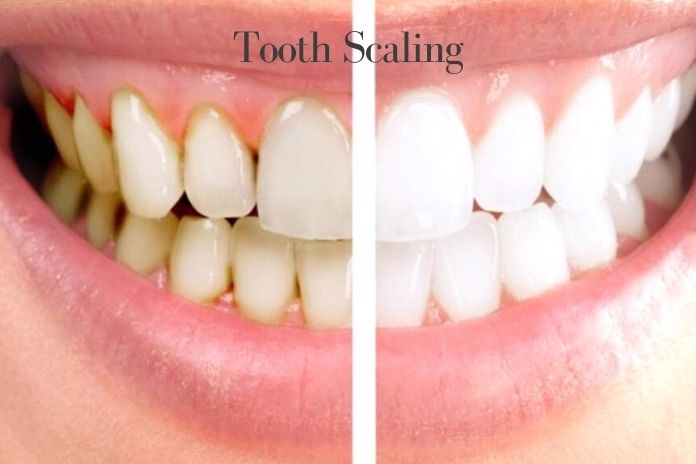Once a year, it is recommended to consult your dentist to remove tartar from the teeth. This is the opportunity to take stock of your oral health. In some cases, a deeper scaling under the gum is necessary to prevent certain diseases.
What Is Dental Tartar?
The scale is naturally deposited on the teeth and gums. It is a kind of film made up of calcium phosphate concretions ( dental plaque ). The chemical reaction is formed from the saliva.
The teeth that “become calcified” most easily are the lower incisors and upper molars because “they are located in front of the excretory ducts of the salivary glands,” explains Dr. Yves Lauverjat, periodontist and professor at the faculty of odontology. From Bordeaux.
Why Is Tooth Scaling Important?
“Tartar is not inherently pathogenic. It is normal to have them,” continues the specialist. The problem is that this tartar behaves like a glue on which bacteria attach themselves. From there, the risk of cavities and periodontal disease (loosening of the teeth) increases. And if the tartar penetrates under the gum, it promotes bacterial aggression, with the risk of gingivitis (reversible inflammation of the gum) or periodontitis (bone loss around the tooth). Hence the importance of descaling.
This can take two forms:
- The preventive descaling is recommended once a year to a dentist. No need for anesthesia.
- The subgingival scaling is called the surfacing root. It is reserved for patients suffering from periodontitis and is performed under local anesthesia.
Why Do Some People Have More Tartar Than Others?
The formation of tartar is very variable from one person to another. It depends on the amount of saliva produced. Patients on antidepressant or anxiolytic treatment secrete less, which can cause oral problems.
Drinking water also has an influence. Thus, waters rich in calcium promote the formation of tartar.
Finally, the accumulation of tartar can be explained quite simply by insufficient brushing :
“Dental plaque re-installs very quickly after brushing. Hence the importance of brushing your teeth at least twice a day. Evening brushing is the most important because it is important to know that tartar is formed mainly at night. During the day, the movements of the tongue and oral fluids limit the phenomenon,” recalls
How Is Scaling Done At The Dentist?
To remove tartar, the dentist usually uses ultrasound. During the operation, the mouth is constantly irrigated to avoid overheating.
- Concretely, instruments are called inserts to send vibrations that will take off the tartar deposits. “You can vary the intensity of these vibrations and use more or less fine inserts to go between the teeth. The intervention is painless. There is no need for anesthesia in the vast majority of cases. It is only when the gums are retracted that local anesthesia is offered”, specifies the specialist.
- To complete the action of ultrasound, the dentist uses curettes which allow him, manually, to find tartar in areas that are difficult to access.
Finally, he finishes by polishing the teeth using a special paste or a powder sprayed under pressure: “This polishing prevents microscopic scratches and leaves a smooth and clean dental surface, on which tartar. will stick less easily.
Subgingival Scaling: In Which Case?
For root planing, this subgingival scaling is performed in the event of periodontitis; local anesthesia is necessary. The dentist uses finer inserts to penetrate deeper under the gum line. The intervention can be done in one to six sessions, depending on the depth of the lesions.
Should I Take Antibiotics For Scaling?
In a healthy person, without particular risk factors, antibiotics are not recommended during simple tooth scaling or root planning.
Only people “at high risk” should take a flash of antibiotic (usually amoxicillin) in a single dose in the hour preceding the treatment.
In these patients, a release of bacteria into the bloodstream could reach the heart valves. There is then a risk of infective endocarditis, a rare but serious complication.
These people considered to be at high risk are:
- patients with a history of endocarditis
- people with a valve prosthesis (stents and pacemakers are not affected)
- patients with certain congenital heart diseases
- immunocompromised people (patients under anti-rejection treatment after an organ transplant, infected with HIV, leukemia, under chemotherapy, etc.).
Against Tartar: What Dental Hygiene?
According to Dr. Lauverjat, no toothpaste is more effective than another against the formation of dental plaque.
He recommends, however, the use of a soft toothbrush, the bristles of which can go into all corners without hurting. “For brushing to be effective, the bristles must be inclined at 45 ° to the tooth, and not horizontally. You have to perform rotary movements without forgetting the internal face of the teeth,” he recalls.
The brushes, which are used to remove tartar from teeth, effectively supplement brushing. “There is little risk of injury, but it is better to learn from your dentist how to use them well so as not to cause micro-abrasions, breaches that would promote the passage of bacteria,” underlines Dr. Lauverjat. The advice is especially valid for dental floss, which, improperly applied between the teeth, can cause gum cuts.
Can You Remove The Scale From Your Teeth At Home?
Some people try to self-scale their teeth with vinegar or baking soda. For Dr. Lauverjat, this technique is not trivial: “There is a risk of burns by chemical aggression.” The game is not worth the candle, especially as Social Security covers this dental treatment.
Is descaling reimbursed?
Social Security reimburses teeth scaling up to 70% of the conventional rate (€ 28.92 on January 1, 2020). The rest can be supplemented by a mutual. Root planing is only supported for people with diabetes, up to 100% in the context of a long-term condition.

